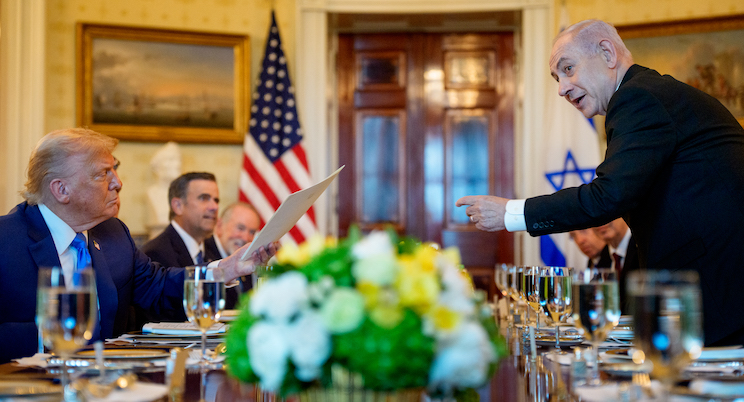Benjamin Netanyahu’s visit to Washington this week had a celebratory but unfinished air. The Israeli prime minister and President Trump were somehow chummier and more businesslike than in previous meetings.
There’s a good reason for that: While the two have been working on a plan for postwar Gaza, the cease-fire has to come first—and it’s proving somewhat elusive.
The delay isn’t on Trump’s end. The president plainly was hoping to announce a deal while Netanyahu was in town. And the delay isn’t on Bibi’s part, because the prime minister clearly wants to give Trump the win he’s looking for. After all, Netanyahu nominated the president for the Nobel Peace Prize, gifted him a mezuzah in the shape of an American B-2 bomber and made from an Iranian missile, and showed off a hat in the MAGA style that said “TRUMP WAS RIGHT ABOUT EVERYTHING!”
By process of elimination, then, the culprit is our old friend Hamas. Why the cold feet?
One likely reason is that, while Netanyahu has seemingly come to accept the need to end the war in the near future, Hamas has gone in the opposite direction.
Any cease-fire deal that ended the war entirely would likely only do so after a 60-day period, which means that what transpires during those two months is what the two sides (three, if you include the U.S.) are arguing about. Here, it is helpful to distinguish between what Hamas says and what it means.
Hamas says that it suspects Netanyahu will be looking for any excuse to resume fighting even if negotiations for extending the cease-fire are taking place.
What it means is that Hamas’s usual strategy of incrementally violating the cease-fire to test Israel’s restraint is riskier than usual for the terror group because their fighting force and their control over the strip are both at low tide. Therefore, the terrorists worry that once Hamas violates the cease-fire, as it eventually will, Israel will give it no second or third chances.
Further, Hamas says it doesn’t trust Israel to remain in key Gaza locations during the cease-fire because it would put Hamas at a massive disadvantage if fighting resumed, and in fact it would practically invite Israeli aggression.
What Hamas means is that it intends to use the cease-fire to regroup, rearm, and resupply. Therefore, Hamas does not want the IDF to be permitted to remain in locations that would prevent the terror group from accessing all areas of the enclave to recruit new fighters, build out supply lines, and murder dissenters.
Witkoff’s position appears to be that Israel must compromise just enough to prevent the appearance of unreasonableness. That way, Hamas won’t be able to walk away without very clearly being responsible for the collapse of negotiations. According to Axios, Israel’s first attempt at mapping its limited redeployment didn’t meet this threshold: “The Qatari official told [Ron] Dermer Hamas would likely reject the proposal and the talks could even collapse over the issue — going so far as to ask that Israel and the U.S. not blame Qatar, which is mediating the talks, if that happens.”
In other words, Israel has to call Hamas’s bluff. If Hamas is truly willing to end the war and return the hostages, it will eventually sign on to a compromise. If Hamas is willing to blow up a deal and incur Trump’s wrath over it, then the terror group simply doesn’t want to end the war and must be defeated in battle. Israel can do that, but Netanyahu will need Trump’s support in order to weather the increasing domestic opposition to the resumption of the war.
Axios reports that the Israeli delegation’s second redeployment map was satisfactory to Witkoff. Hamas is running out of excuses and will soon run out of time.


















